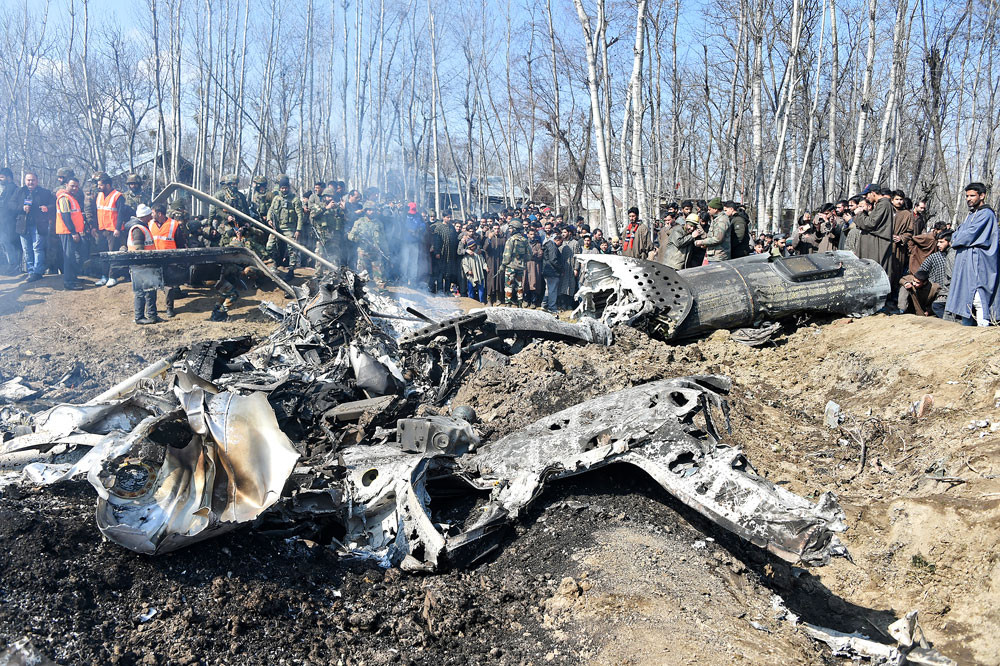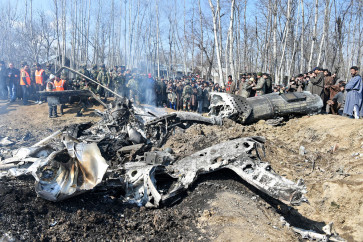Popular Reads
Top Results
Can't find what you're looking for?
View all search resultsPopular Reads
Top Results
Can't find what you're looking for?
View all search resultsDrums of war in Kashmir
Change text size
Gift Premium Articles
to Anyone
 From air to ashes: Indian soldiers and Kashmiri onlookers stand near the remains of an Indian Air Force helicopter after it crashed in Budgam district, outside Srinagar. Officials said an investigation was underway into the cause of the crash, which came as Pakistan claimed to have shot down two Indian fighter jets in the divided and disputed Kashmir region. (AFP/Tauseef Mustafa)
From air to ashes: Indian soldiers and Kashmiri onlookers stand near the remains of an Indian Air Force helicopter after it crashed in Budgam district, outside Srinagar. Officials said an investigation was underway into the cause of the crash, which came as Pakistan claimed to have shot down two Indian fighter jets in the divided and disputed Kashmir region. (AFP/Tauseef Mustafa)
T
ensions between India and Pakistan are at their highest level in decades, and many fear the nuclear-armed neighbors are on the brink of yet another war over the disputed Kashmir region. But the latest eruption is different from its predecessors.
The two countries’ struggle over Kashmir began in 1947. After Pakistan supported a Muslim insurgency in the princely state of Jammu and Kashmir, the state’s Hindu ruler, Maharaja Hari Singh, decided to cede the territory to India in exchange for armed assistance. Since the state’s population was predominantly Muslim, however, Pakistan cried foul and sent in troops, which India countered with more troops of its own.
The war resulted in a stalemate, with the United Nations helping to secure a cease-fire in 1949. As part of the deal, the state was divided between India and Pakistan — and remains so to this day.
The fight over Kashmir picked up again in 1965, when Pakistan sent troops to an Indian-controlled area to encourage locals to revolt against their “occupiers”. But, instead of spurring a rebellion, Pakistan elicited a major offensive by India. A 17-day war ensued, but the status quo prevailed.
The two sides fought again in 1971, though Kashmir was not the focus. After the civil war pitting then-West Pakistan against the Bengali freedom fighters of then-East Pakistan fueled a wave of refugees from the east, India began supporting rebel groups there. West Pakistan was forced to surrender and East Pakistan became the independent state of Bangladesh.
Then, in 1999, another Indo-Pakistani skirmish over Kashmir erupted, after Pakistan sent troops to the Indian-controlled district of Kargil. India responded forcefully, launching air strikes and threatening all-out war. The conflict was cut short when then-United States president Bill Clinton convinced then-Pakistani prime minister Nawaz Sharif to withdraw his forces from the area.
Whereas Pakistan provoked previous Indo-Pakistani conflicts, India is driving the current one. To be sure, the escalation was triggered by an attack on Indian paramilitary police: On Feb. 14, a young militant in Indian-administered Kashmir carried out a suicide bombing that killed 40. The next day, the Pakistan-based Jaish-e-Mohammed terrorist group claimed responsibility for the bombing.

















